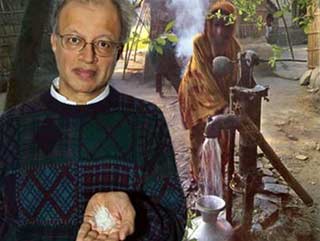10 million people may be at risk due to well water, particularly from arsenic contamination. This seemingly unsolvable problem can be addressed through the traditional water filtration methods used in Bangladesh.
 |
|
Professor Gadgil and arsenic filter bags (Photo: TTO) |
In fact, scientists have been aware of this issue for over a decade. Similar to our own country, arsenic-contaminated water is considered dangerous for the well water of the impoverished population in Bangladesh. This problem is viewed as even more serious as scientists predict that 10% of the total population of 130 million in this country could die from this contaminated well water.
Scientist Ashok Gadgil from the Lawrence Berkeley National Laboratory has researched low-cost yet effective solutions that enable 60 million people in Bangladesh to safely use arsenic-contaminated well water. Gadgil and his colleagues discovered that coal ash contains ferric hydroxide, a substance capable of absorbing arsenic.
This coal ash consists of very small particles, ranging from 1 to 10 microns in size (smaller than a human hair, which is about 100 microns). Therefore, even in small amounts, the ash can react with arsenic. Experiments showed that a water sample with arsenic levels of 2,400 ppb (parts per billion) could be reduced to 10 ppb after filtration. According to Bangladesh standards, safe drinking water is defined as having arsenic levels of 50 ppb. Calculations indicate that 5 grams of coal ash can filter approximately 11 liters of water with an average arsenic contamination level of 400 ppb, rendering it safe for drinking.
Additionally, since coal is burned at temperatures of 800oC, the ash is a form of sterilized powder. Coal ash is a very simple and abundant material. It is estimated that ash accounts for up to 40% of the weight after coal is burned. Filter bags containing coal ash, similar in size to tea bags, can purify arsenic from enough water to meet the drinking needs of six people in one day. People can be guided to make their own small coal ash filter bags, with a cost of about $0.30 per person per year.
It is hard to believe that just using ash, Gadgil and his colleagues have provided safe drinking water for the poor. Currently, this system is being utilized in several countries, including Mexico, the Philippines, India, and others.


















































